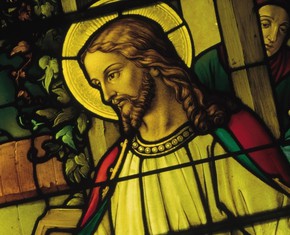The views expressed in our content reflect individual perspectives and do not represent the authoritative views of the Baha'i Faith.
The hope and purity of thought and belief in the Bible’s description of the Pentecost contrasts starkly with another set of considerations regarding some aspects of modern-day Christianity.
Recently, driving through Eden, Texas, I came across a churchyard sign that revealed one type of modern Christian idea about the end of the world: “Repent for the Kingdom of God is Near.”
This kind of apocalyptic belief can lead to some poor choices by leaders who may be influenced by fundamentalist thinking. For example, people in some evangelical Christian circles believe that recent political figures of one stripe or another may have been sent by God to hasten the advent of the “end times.” It’s hard to know if this kind of thinking influences irrational decision-making – but it certainly doesn’t help.
In some ways, this alarming world view of destruction, defeat and doom can result in apathy about world conditions – a kind of fatalist mindset that believes that all one must do is wait for imminent cataclysmic events. From this perspective, the world is an evil place which deserves and needs to be destroyed.
This concept contrasts dramatically with the essential Baha’i teachings, which take a very different view. Yes, the Baha’i writings say, the world is suffering and in decline right before our eyes, but an abundant and peaceful future awaits humanity, because God has spoken again with a message of hope for this day through his newest messenger Baha’u’llah:
O peoples of the world! The Sun of Truth hath risen to illumine the whole earth, and to spiritualize the community of man. Laudable are the results and the fruits thereof, abundant the holy evidences deriving from this grace. This is mercy unalloyed and purest bounty; it is light for the world and all its peoples; it is harmony and fellowship, and love and solidarity; indeed it is compassion and unity, and the end of foreignness; it is the being at one, in complete dignity and freedom, with all on earth. – Abdu’l-Baha, Selections from the Writings of Abdu’l-Baha, p. 1.
Back to the church and its sign in Eden. The church there, a part of the Missouri Synod of the Lutheran church, preaches a literal interpretation of the Bible. My family and I know a little about this because we enrolled our young son in their Pre-K day school program a few years ago. Our child brought home pictures of Biblical themes that he had colored, including a picture of Noah loading animals onto the ark, two by two. This seemed okay to us, but we weren’t happy to learn that everything in the Bible, Noah and the ark, and Adam and Eve, etc., was taught to the children as literally true, with no symbolic or metaphorical meanings to consider whatsoever.
Speaking of Eden, the literal interpretation of the story of Adam and Eve, and their departure from the Garden, have come down through history and caused a great deal of difficulty for us through the influence of that story, especially its negative stereotyping of women as evil temptresses who lead others to sin. These fundamentalist beliefs have impacted Western culture and society, which as a result needs another recalculation of God’s tenets for this current human family, once previous teachings have lost their vitality, been corrupted, and run us off into a ditch. That, the Baha’i teachings say, explains why religion must always be subject to renewal:
The religion of God is one religion, but it must ever be renewed. Moses, for example, was sent forth to man and He established a Law, and the Children of Israel, through that Mosaic Law, were delivered out of their ignorance and came into the light; they were lifted up from their abjectness and attained to a glory that fadeth not. Still, as the long years wore on, that radiance passed by, that splendour set, that bright day turned to night; and once that night grew triply dark, the star of the Messiah dawned, so that again a glory lit the world.
Our meaning is this: the religion of God is one, and it is the educator of humankind, but still, it needs must be made new. – Abdu’l-Baha, Selections from the Writings of Abdu’l-Baha, p. 51.
Baha’u’llah on his regard for the messenger of God, Jesus Christ:
We testify that when He [Jesus Christ] came into the world, He shed the splendor of His glory upon all created things. Through Him the leper recovered from the leprosy of perversity and ignorance. Through Him, the unchaste and wayward were healed. Through His power, born of Almighty God, the eyes of the blind were opened, and the soul of the sinner sanctified.
Leprosy may be interpreted as any veil that interveneth between man and the recognition of the Lord, his God. Whoso alloweth himself to be shut out from Him is indeed a leper, who shall not be remembered in the Kingdom of God, the Mighty, the All-Praised. We bear witness that through the power of the Word of God every leper was cleansed, every sickness was healed, every human infirmity was banished. He it is Who purified the world. Blessed is the man who, with a face beaming with light, hath turned towards Him. – Baha’u’llah, Gleanings from the Writings of Baha’u’llah, p. 86.
Baha’u’llah’s expression of love of and esteem for Jesus and his works have affirmed my continuing and deepening relationship with my Christian heritage – and the new fulfillment of that Christianity the Baha’i Faith has given me.
You May Also Like
Comments

















Well said. The denial and demonization of the world was originally a gnostic heresy. The belief in the incarnation logically includes the affirmation of the world. The essence of the Gospel: „FOR GOD SO LOVED (!) THE WORLD, that he gave his only begotten Son, that whosoever ...believeth in him should not perish, but have everlasting life.“